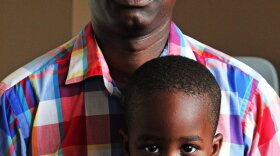Austin's already welcomed the Burmese, the Iraqis and the Bhutanese. But starting at end of this year, Austin will begin to welcome its newest round of refugees – the Congolese.
Over the next few years, the U.S. expects to resettle approximately 50,000 refugees from the Democratic Republic of the Congo in the U.S. 10 percent of those refugees may end up in Texas, according to Erica Schmidt, the Austin-area director for Refugee Services of Texas.
Texas is one of the largest states to resettle refugees. Schmidt says it is extremely appealing for resettlement because of its strong economy, extreme job growth and general welcoming environment to immigrants.
Between October 2012 and May 2013, the state took in 4,802 admitted refugees – over 10 percent of the U.S. total. The Congolese are already beginning to trickle into Texas: 28 individuals have been settled this year, according to the State Department’s Bureau of Population, Refugees and Migration.
But what does Austin need to know about its newest neighbors?
- The Democratic Republic of the Congo is a large, diverse country.

Approximately 7,750 miles separate Austin and Kinshasa, the capital of the Democratic Republic of the Congo (DRC). The DRC is the eleventh largest county geographically in the world – it's the size of the U.S. east of the Mississippi River – with a population of more than 75 million people, almost completely landlocked in the center of the Africa and bordering nine countries.
French is the official language thanks to the years the Congo spent as a Belgian colony. But the majority of refugees’ native languages are either Kinyarwanda (37 percent) or Kiswahili, aka Swahili (32 percent), according to the Cultural Orientation Center.
There are more than 200 ethnic groups, and the four largest tribes make up 45 percent of the population, according to the CIA World Factbook.
- The DRC is one of the most dangerous places in the world.
The distance isn’t the only thing making the Congo a world away from Austin. Decades of conflict, political unrest and civil war have made the former Belgian colony one of the most conflicted places on the planet. The use of sexual assault as a war tactic against woman has resulted in the eastern Congo being labeled by the United Nations Human Rights Council as one of the most dangerous places in the world for women. Starting at the beginning of 2012, approximately 2.2 million Congolese had been internally displaced inside the country and an additional 70,000 sought asylum in neighboring countries like Rwanda and Uganda, according to the UN.
- Congolese refugees will face many challenges – even in Austin.
Austin’s refugee community anticipates many areas to address in the coming wave of refugees, including increased levels of trauma and post traumatic stress disorder. And with a population where 65 percent is under 24, many of the concerns are directed towards the youth.
According to the Cultural Orientation Center, 66 percent of children ages five to 17 have had only an elementary school education. Some children have grown up in Congo's many refugee camps with limited access to education, according to the UN.
Samantha McGrath, Clinical Director of the Center for Survivors of Torture, says she hopes to see more Congolese clients as they begin moving in. They’ve recently set up a program for children, which they intend to use with Congolese refugees.
“We start pretty much the same that we do for adults, establishing safety and trust,” McGrath says. “These children have a lot of need just to feel loved and comforted, and they can work their way into therapy.”
Another issue is family size, which can extend to a dozen people. That can make it difficult to find correctly-sized housing at an affordable price, according to Schmidt.
- The Congolese stick together tightly.
With so much emphasis on the trauma and conflict rising out of the DRC, the resilience, strength and close family culture of the Congolese is often overshadowed.
“They move together, they absorb everything they’re learning collectively,” Schmidt says about one recently resettled family. “Nobody is being left out of it, and that shows incredible resiliency within the Congolese. They’re ready to learn. They’re ready to move forward to begin a stable future here in Austin.”



